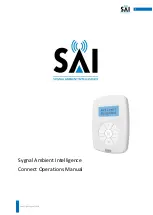
76
Connect Devices
WAGO-I/O-SYSTEM 750
750-8100 PFC100; 2ETH; ECO
Manual
Version 1.6.0, valid from FW Version 03.02.02(14)
6.2
Power Supply Concept
6.2.1
Overcurrent Protection
Possible fire hazard due to insufficient overcurrent protection!
In the event of a fault, insufficient overcurrent protection can present a possible
fire hazard. In the event of a fault, excessive current flow in the components can
cause significant overheating. Therefore, you should always dimension the
overcurrent protection according to the anticipated power usage.
The system and field voltage of the WAGO-I/O-SYSTEMs 750 is supplied on the
head stations and bus supply modules.
For components that work with extra low voltage, only SELV/PELV voltage
sources should be used.
A single voltage source supplying multiple components must be designed
according to the component with the strictest electrical safety requirements.
For components which are only allowed to be supplied by SELV voltage sources,
these requirements are listed in the technical data.
Most components in the WAGO-I/O-SYSTEM 750 have no internal overcurrent
protection. Therefore, appropriate overcurrent production must always be
implemented externally for the power supply to these components, e.g. via fuses.
The maximum permissible current is listed in the technical data of the
components used.
System supply only with appropriate fuse protection!
Without overcurrent protection, the electronics can be damaged.
If you implement the overcurrent protection for the system supply with a fuse, a
fuse, max. 2 A, slow-acting, should be used.
Field supply only with appropriate fuse protection!
Without overcurrent protection, the electronics can be damaged.
If you alternatively implement the overcurrent protection for the field supply with
an external fuse, a 10 A fuse should be used.
















































